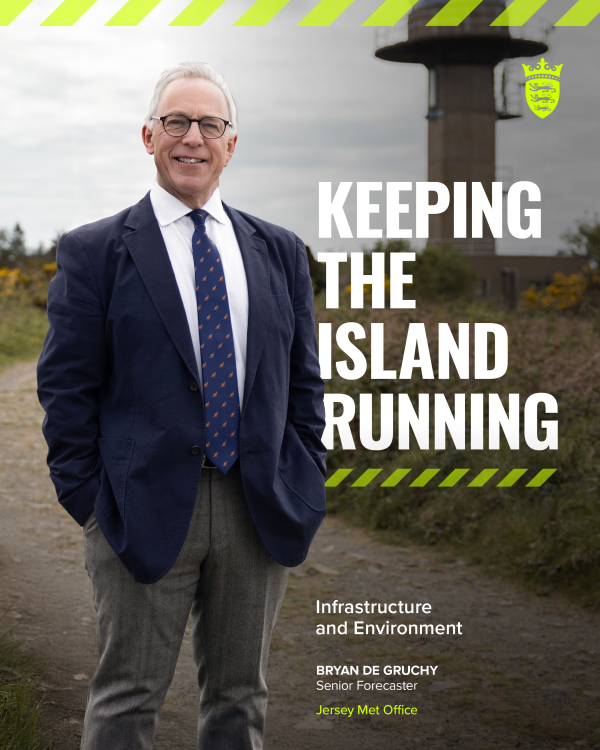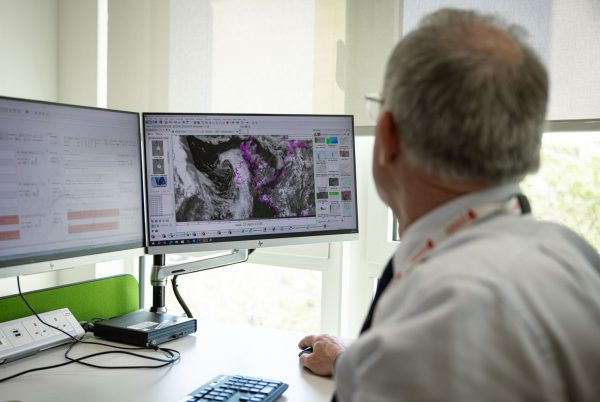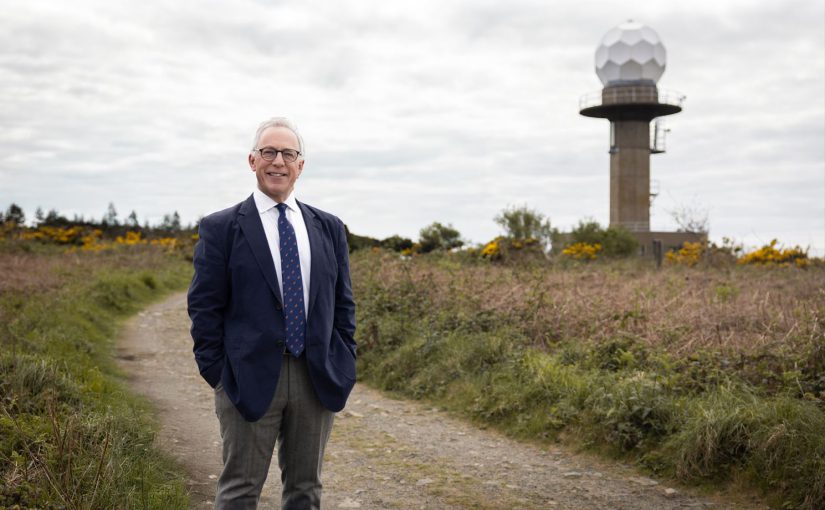From bracing snowstorms at the airport, to informing farmers on whether to cover their potatoes, Senior Forecaster, Bryan de Gruchy, has seen it all in his three decades in the Infrastructure and Environment Department’s Meteorological Section.
Bryan said: “A lot of what people see is just a basic weather forecast telling us whether it’s going to be rainy or windy, if you can have a barbecue, or cycle to work. But actually, a lot of what we do informs people who make big and sometimes costly decisions.

“Weather has a big impact on farmers who may be worried about ground frost at critical times in the growing season – they need to know whether to keep their potatoes covered or uncovered, whether to irrigate or not.
“There’s also the construction industry – we often have people on the phone asking for a forecast to plan their work, it can save them money by having the latest information.
“It’s not just about whether you can put the washing out.” Bryan says with a smile.
Three decades in the job
Bryan’s career in Jersey Met Office spans nearly 33 years, having joined the team back in 1992 when they were based at Jersey Airport.
Bryan said: “I started my working life in the finance industry for a short time, but my background was more science orientated. So, I got a job with Jersey Met as a general assistant and observer.
“In those days, a lot more was done manually, things like plotting charts, analysing data, it was all very hands-on. I did a bit more studying which enabled me to go on the forecasting course with the UK Met Office, recognised by the World Meteorological Organisation, which is essential for the work we do for aviation. I became a forecaster then – and I’ll have been dealing with the weather for 33 years in September.”
Despite sacrificing the 9-5 office job for round-the-clock shift hours, Bryan explains how it is one of the reasons he loves his job: “I like the shift work, I like the variety, it’s really nice being able to provide information that people are interested in. We have lots of younger people joining the team now, and they have lots of different and new ideas about how people use weather information.”
A day in the life of a Senior Forecaster
Weather forecasts, severe weather and tide warnings, marine and aviation briefs, live radio updates, emergency service briefings – the list goes on.
Bryan explains: “So day-to-day forecasting is all about analysing model data, verifying that against the reality of what is happening and applying our local knowledge of how it will affect the Islands. We make sure everything is always up to date and accurate. Some forecasts we issue, particularly for aviation, are regulated and need to follow certain rules. So, these must be carefully monitored.
“We brief airline pilots and the coastguard as well. The harbour for example, has certain wind criteria that affect how some ships can operate safely.”
A critical piece of equipment for the Jersey Met is the weather radar found in St Brelade, which shows rainfall in a 250-kilometre radius from the Island.
Bryan said: “If you’re watching the weather forecasts on the television – for example on BBC or ITV – they show the rainfall moving across the UK. Well, part of that image will be from the radar here.”

Checking in for the night at Jersey Airport
During a night in the 1990’s when a forecast of snow took a turn for the worse, Bryan reshares a story of when he spent the night sleeping at the airport: “We had been expecting some snow, it started around 4pm and we thought it would very quickly turn into rain – that would be it. Well, it was still snowing 12 hours later!
“I was on an afternoon and evening shift so I should have been finishing work around 9pm and starting again the following morning, but there was no way I was going to get home and back again in the morning. As weather forecasters we can’t just take a ‘snow day’ and say we can’t make it into work – we have to be in.
“So I just bedded down for the night in one of the side rooms at the airport and got up the following morning. We all just carried on.”
The equipment and models have come a long way since then, however this story highlights the occasional unpredictability of weather which can be a challenge for the team.
Bryan adds: “Quite a lot of what we do is about communicating a message and communicating any uncertainty around that. It’s not always easy to be 100% accurate on a small Island or group of Islands, even with all the equipment and models. Weather can be very unpredictable at times, very small changes can make the outcome very different.”
Don’t rely on weather apps
More often than not the forecasts on phone apps are doing something entirely different to what can be seen out of the window.
Bryan explains: “All the stuff on your phone is just driven by raw model data and hasn’t been verified against anything, so it is often inaccurate. That’s why if you look at one person’s app on their phone it’s going to say its cloudy all day, and another person’s app will say it’s sunny. That’s because it’s been driven by two different forecasting models.
“The best advice is always to look at the Government website – it’s got a local forecaster’s input.”
Weather is not the same as climate
Bryan explains how climate change plays a growing role in the team’s work: “We now deal with more severe weather events, rainfall events that can be potentially troubling, so it’s about communicating that to emergency planners so they can manage those risks.
“We’ve seen it a couple times this winter where we’ve had significant rainfall events that puts a strain on certain parts of the Island’s infrastructure.
“There’s also the health side of things. So, we look at things like heat warnings because we are seeing increasing temperatures which can be quite troubling for people. We have statistics dating back to 1894, and you know it’s clear that temperatures are rising.
“That’s not to say every year is going to be hot and sunny. Weather and climate are two different things. Climate is what we expect, weather is what we get.”
So next time you check ‘gov.je/weather’, remember that behind every forecast is a team of experts like Bryan who are analysing, updating and keeping Jersey running, one step ahead of the storm.

 blog.gov.je
blog.gov.je